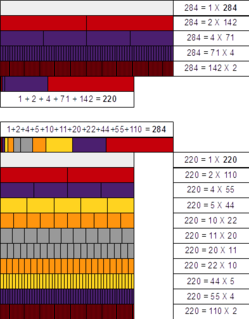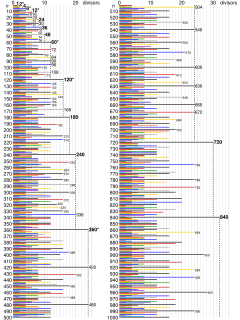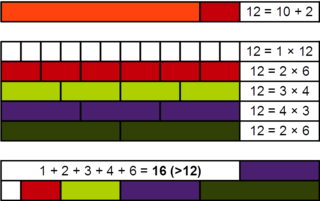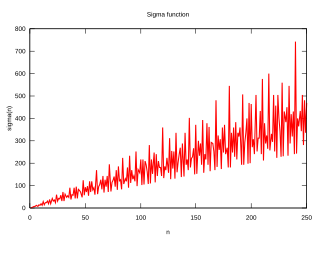
Amicable numbers are two different natural numbers related in such a way that the sum of the proper divisors of each is equal to the other number. That is, σ(a)=b and σ(b)=a, where σ(n) is equal to the sum of positive divisors of n.

In number theory, a perfect number is a positive integer that is equal to the sum of its positive divisors, excluding the number itself. For instance, 6 has divisors 1, 2 and 3, and 1 + 2 + 3 = 6, so 6 is a perfect number.
A highly composite number is a positive integer with more divisors than any smaller positive integer has. The related concept of largely composite number refers to a positive integer which has at least as many divisors as any smaller positive integer. The name can be somewhat misleading, as two highly composite numbers are not actually composite numbers.

The tables below list all of the divisors of the numbers 1 to 1000.

In number theory, an abundant number or excessive number is a number for which the sum of its proper divisors is greater than the number. The integer 12 is the first abundant number. Its proper divisors are 1, 2, 3, 4 and 6 for a total of 16. The amount by which the sum exceeds the number is the abundance. The number 12 has an abundance of 4, for example.

In number theory, a deficient number or defective number is a number n for which the sum of divisors of n is less than 2n. Equivalently, it is a number for which the sum of proper divisors is less than n. For example, the proper divisors of 8 are 1, 2, and 4, and their sum is less than 8, so 8 is deficient.

In number theory, a semiperfect number or pseudoperfect number is a natural number n that is equal to the sum of all or some of its proper divisors. A semiperfect number that is equal to the sum of all its proper divisors is a perfect number.

In number theory, a weird number is a natural number that is abundant but not semiperfect.

In mathematics, an almost perfect number (sometimes also called slightly defective or least deficientnumber) is a natural number n such that the sum of all divisors of n (the sum-of-divisors function σ(n)) is equal to 2n − 1, the sum of all proper divisors of n, s(n) = σ(n) − n, then being equal to n − 1. The only known almost perfect numbers are powers of 2 with non-negative exponents (sequence A000079 in the OEIS). Therefore the only known odd almost perfect number is 20 = 1, and the only known even almost perfect numbers are those of the form 2k for some positive number k; however, it has not been shown that all almost perfect numbers are of this form. It is known that an odd almost perfect number greater than 1 would have at least six prime factors.
In mathematics, an aliquot sequence is a sequence of positive integers in which each term is the sum of the proper divisors of the previous term. If the sequence reaches the number 1, it ends, since the sum of the proper divisors of 1 is 0.
2000 is a natural number following 1999 and preceding 2001.
An untouchable number is a positive integer that cannot be expressed as the sum of all the proper divisors of any positive integer. That is, these numbers are not in the image of the aliquot sum function. Their study goes back at least to Abu Mansur al-Baghdadi, who observed that both 2 and 5 are untouchable.

In number theory, a practical number or panarithmic number is a positive integer such that all smaller positive integers can be represented as sums of distinct divisors of . For example, 12 is a practical number because all the numbers from 1 to 11 can be expressed as sums of its divisors 1, 2, 3, 4, and 6: as well as these divisors themselves, we have 5 = 3 + 2, 7 = 6 + 1, 8 = 6 + 2, 9 = 6 + 3, 10 = 6 + 3 + 1, and 11 = 6 + 3 + 2.
In mathematics, a superabundant number is a certain kind of natural number. A natural number n is called superabundant precisely when, for all m < n

In mathematics, a colossally abundant number is a natural number that, in a particular, rigorous sense, has many divisors. Formally, a number n is colossally abundant if and only if there is an ε > 0 such that for all k > 1,

In mathematics, a highly abundant number is a natural number with the property that the sum of its divisors is greater than the sum of the divisors of any smaller natural number.
In number theory, friendly numbers are two or more natural numbers with a common abundancy index, the ratio between the sum of divisors of a number and the number itself. Two numbers with the same "abundancy" form a friendly pair; n numbers with the same "abundancy" form a friendly n-tuple.
In number theory, the aliquot sums(n) of a positive integer n is the sum of all proper divisors of n, that is, all divisors of n other than n itself. That is,
In mathematics, specifically number theory, Granville numbers, also known as -perfect numbers, are an extension of the perfect numbers.
840 is the natural number following 839 and preceding 841.











